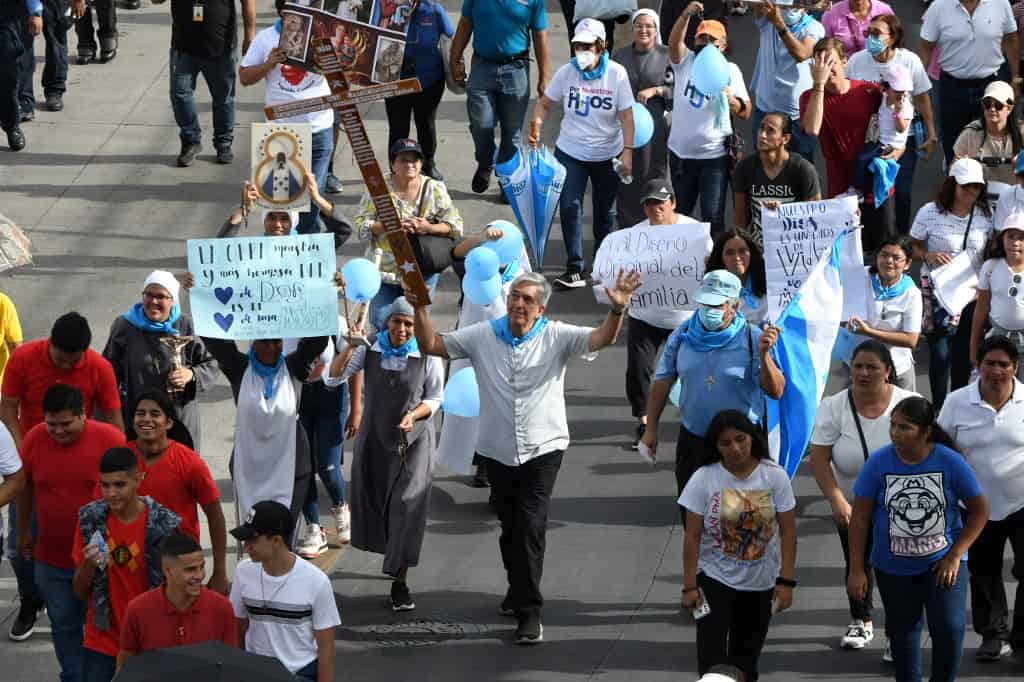Thousands of Hondurans marched in the capital and other cities of the country on Saturday to demand that the government veto a sex education law that, according to the demonstrators, promotes “gender ideology.”
The protesters, who were mostly Catholic and Evangelical, carried signs that read “Defend the original design of the family” and “We are all pro-life.” They also chanted slogans against the law, which they say will “destroy the family.”
The Comprehensive Adolescent Pregnancy Prevention Education Law was approved by the Congress last March and is aimed at young people. It has not yet come into effect.
The law’s critics say that it promotes “gender ideology,” which they define as the belief that there are more than two genders. They argue that this ideology is harmful to the Honduran family, which they say is based on the traditional model of a man and a woman.
The law’s supporters say that it is necessary to provide young people with accurate information about sex and sexuality in order to prevent teenage pregnancy. They also say that the law does not promote “gender ideology” and that it respects the traditional family model.
The UNFPA, the United Nations Population Fund, has expressed concern about the misinformation campaigns in Honduras about the law. The UNFPA said that the law is a “necessary and pertinent law” that seeks to address the worrying reality of teenage pregnancy in the country.
The Honduran government has not yet said whether it will veto the law. President Xiomara Castro has said that she will study the law carefully before making a decision.
The debate over the law is likely to continue in Honduras. It is a complex issue with no easy answers. However, it is important to have a public discussion about the issue so that people can be informed about the law and its potential impact.
Mixed Reactions to Law
The law has been met with mixed reactions from the public. Some people support the law, while others oppose it.
Those who support the law say that it is necessary to provide young people with accurate information about sex and sexuality in order to prevent teenage pregnancy. They also say that the law does not promote “gender ideology” and that it respects the traditional family model.
Those who oppose the law say that it promotes “gender ideology,” which they define as the belief that there are more than two genders. They argue that this ideology is harmful to the Honduran family, which they say is based on the traditional model of a man and a woman.
Religious Groups Oppose Law
The law has been criticized by some religious groups, who argue that it promotes “gender ideology” and undermines the traditional family.
The Catholic Church, for example, has said that the law is “a threat to the family” and that it “undermines the dignity of the human person.” The Evangelical Church of Honduras has also said that the law is “a danger to the family” and that it “promotes a false ideology.”
Human Rights Groups Support Law
The law has been praised by some human rights groups, who argue that it is necessary to provide young people with accurate information about sex and sexuality in order to prevent teenage pregnancy.
The UNFPA, for example, has said that the law is a “necessary and pertinent law” that seeks to address the worrying reality of teenage pregnancy in the country. The Honduran Commission for the Promotion and Protection of Human Rights has also said that the law is “an important step forward in the fight against teenage pregnancy.”
Law Still Being Debated
The law is still being debated in Honduras, and it is not clear whether it will be implemented. President Xiomara Castro has said that she will study the law carefully before making a decision.
The debate over the law is likely to continue in Honduras. It is a complex issue with no easy answers. However, it is important to have a public discussion about the issue so that people can be informed about the law and its potential impact.






